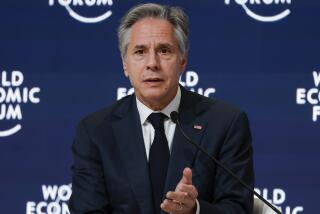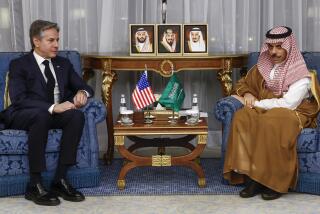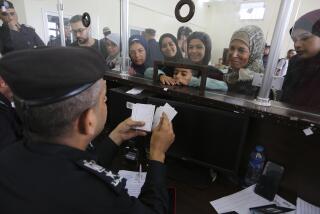Christopher to Return to Mideast Soon : Diplomacy: Secretary of state cites progress but will revisit region to try closing Syria-Israel gap.
- Share via
SHANNON, Ireland — Buoyed by a week of progress on his sixth Mideast peace shuttle, Secretary of State Warren Christopher said Friday that he will return to the region within the next three weeks to try to close the still “substantial gap” between Syria and Israel.
After talks with President Hafez Assad in Damascus, Christopher said the Syrian and Israeli leaders have now passed beyond the initial posturing stage and are engaged in negotiating specifics.
“Prior to this trip, there was a great deal of psychological testing of one party for another, a great deal of who goes first,” he said. “They seem to be past that now . They’re seriously engaged in the key issues like withdrawal, timing, phasing, the aspects of peace and security. They’re dealing with the issues, and both have an attitude to achieve something on this track.”
Christopher also denied that Assad is now the odd man out in the Middle East in light of recent progress between Israel and Jordan and the Palestine Liberation Organization. “The comprehensiveness of the peace continues to be the goal of everyone in the region,” he said. And Assad “continues to play a central role in the Middle East.”
But he also told reporters en route home that he does not expect a breakthrough on the Syrian track, the centerpiece of a comprehensive Mideast settlement, in the near future. The Friday session was Christopher’s second stop in Syria this week.
At a summit in January, President Clinton and the Syrian leader pledged to try to achieve a breakthrough by the year’s end. Christopher refused to predict Friday whether the deadline would be met.
The state-controlled Syrian press Friday blamed the United States for the absence of major movement. “There is no doubt that the United States holds a responsibility for the lack of progress in the peace talks because it did not exert enough efforts to stop Israel’s disregard of international will,” the government daily Al Thawra said. The criticism was in stark contrast to upbeat editorials during Christopher’s first visit Tuesday.
Unlike in peace tracks with Jordan and the Palestinians, the U.S. team has vowed not to disclose details of Syrian and Israeli positions because of their sensitive nature. Both governments are believed to face significant domestic opposition to terms for peace.
Israeli officials have said their initial offer centered on a three-stage, land-for-peace swap involving the strategic Golan Heights, which Israel captured in 1967 and annexed in 1981.
The biggest stumbling blocks are Israel’s insistence on full normalization of relations, borders and trade from the start of a deal and Syria’s demand that Israel first pledge to return all of the Golan Heights.
On the topic of the latest, apparently failed peace effort for Bosnia-Herzegovina, Christopher said the United States expects Russia to use its influence and special relationship with the rebel Bosnian Serbs to pressure them to reverse their position and accept unconditionally the international peace plan before July 30.
He talked by telephone with Russian Foreign Minister Andrei V. Kozyrev. He said the Russian government pledged to take “special measures” to contact the Bosnian Serbs before the five world powers who had sought to mediate a peace in Bosnia meet in Geneva to discuss punitive measures against the Bosnian Serbs for rejecting the partition plan.
More to Read
Sign up for Essential California
The most important California stories and recommendations in your inbox every morning.
You may occasionally receive promotional content from the Los Angeles Times.













